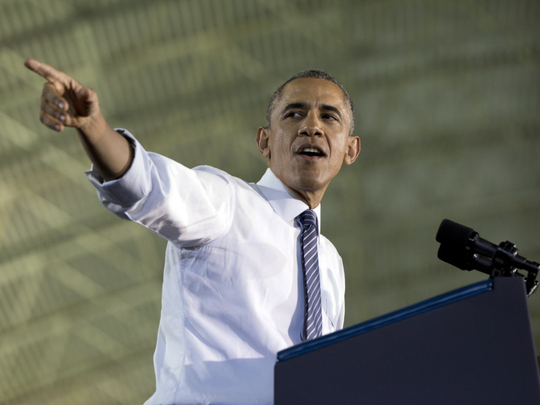
When a Democratic president talks up “trans-gender” rights in prime time, you can be sure he does not face re-election.
In Barack Obama’s case, his second to last State of the Union address was delivered with an extra dose of mojo. Bill Clinton said the best test of a speech is to put on the mute button. To judge by Obama’s mien, Democrats may as well have romped to victory in last year’s mid-term elections — as opposed to having lost control of Capitol Hill.
Since then, Obama has acted as though the world’s weight has been lifted off his shoulders. Gone are the formulaic exhortations to bipartisanship.
The US president set out the case for a “middle class economics” and “smarter leadership abroad”. These are unapologetic liberal themes. The more sullen Republicans seemed during the speech, the greater the president’s swagger.
Whatever else can be said of Obama’s address, his Kumbaya days are over. That was the tone. The substance was next year’s presidential election. Very little, if anything, in the first half of Obama’s long speech — it was more than five times the length of the Declaration of Independence — stands much chance of passing a Republican Congress.
These include Obama’s already well-trailed proposals to increase investment in the internet, raise the federal minimum wage, enact equal pay for women, make community college free and raise capital gains tax to pay for new middle class tax credits.
But that was not the intention. Obama’s real game was to set the field for Hillary Clinton’s election victory next year, which is also Obama’s best hope of cementing his legacy. Each of his proposals are minutely poll-tested. The larger theme of the US having recaptured its economic buoyancy but leaving much of the middle class behind resonates with most voters.
Given Obama’s domestic constraints, the global section of his speech was more immediately relevant. It was just as unapologetic and showed a degree of confidence Obama rarely finds on foreign policy. “When what you’re doing hasn’t worked for 50 years, it is time to try something new,” Obama said about his recent opening to Cuba. It was received in stony silence on the Republican side of the chamber. The same applied to his observation that 14 of the 15 hottest years on record were since the start of the 21st century. Ditto for his repeated promise (now the sixth consecutive year) to close the Guantanamo Bay detention centre.
He also claimed victory for his strategy of avoiding overreaction to Russian President Vladimir Putin’s western expansionism. The Russian leader was now apparently friendless and his economy was in tatters. “That’s what we do, we avoid bluster and lead with persistent, steady, resolve,” he said. Obama would also veto any attempt by Congress to impose fresh sanctions on Iran before he had given peace a chance. And so on.
There was a lot of hubris in his speech. Events have a way of confounding bold assertions about the rest of the world.
But it was not the address of someone who thinks of himself as a lame duck. The line of the night was not even in the script. Towards the end, a group of Republicans started to applaud when Obama said he would never face re-election.
“I know,” he quipped, “because I won both of them.”
Having endured some of the bitterest partisanship in recent history, Obama is discovering the parts of the job he enjoys. That may no longer include trying to meet his opponents halfway.
Last Tuesday’s real message is that Obama’s priority in his last two years will be to secure another Clinton presidency.
— Financial Times











